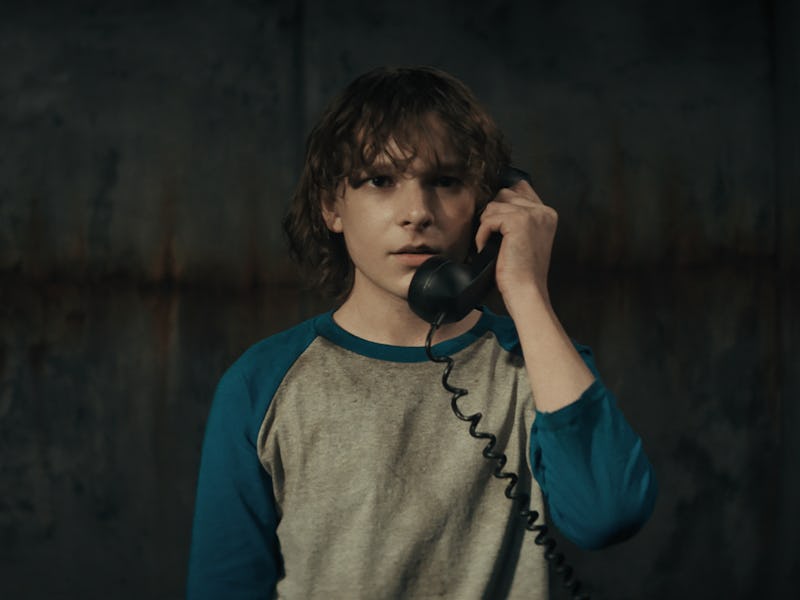The Black Phone ending explained: Are the ghosts in Joe Hill's story real?
In Scott Derrickson’s newest horror movie, a kidnapped teenager receives unlikely help from beyond. But is it all in his imagination?

If a phone rings and it’s not connected, would you pick it up? What if it can save your life?
In The Black Phone, the newest thriller from director Scott Derrickson, a teenager receives ghostly phone calls from the past victims of his kidnapper.
Based on a short story from Joe Hill, and adapted by the writer/director team behind Sinister and Doctor Strange, The Black Phone is a menacing movie for the dog days of summer with an unbelievable performance by Ethan Hawke.
It’s not a complicated film, but its magical realism blurs the line between reality and fantasy as one young man tries desperately to survive. For those still scratching their heads, we’ve got the explanation to the ending of The Black Phone.
Warning: Spoilers for The Black Phone ahead.
In The Black Phone, a kidnapped teenager receives help from ghosts telephoning long distance.
In The Black Phone, it’s 1978 and a small Colorado town is terrorized by a serial kidnapper known only by his nickname, “The Grabber” (Ethan Hawke). Finney (Mason Thames) is a young teenager who becomes the Grabber’s latest victim. Through a disconnected telephone, Finney receives help from the Grabber’s past victims, who advise him on how to escape based on their own failed attempts. Finney also has a sister, Gwen (Madeleine McGraw), a psychic who works with the police to find his whereabouts.
The end of the film is pretty straightforward. All of the Grabber’s victims aid Finney in some way, be it helping him bury a strategic hole or find a cable to help him climb. The last bit of help comes from Finney’s friend, Robin (Miguel Cazarez Mora), a karate-kicking punk who defended Finney from bullies. With the help of Robin, Finney learns to fight the Grabber hand-to-hand.
Ethan Hawke delivers a career-highlight performance as “The Grabber,” a neighborhood kidnapper with a penchant for the dramatic.
In a final confrontation, Finney tricks the Grabber into a vulnerable position. With a rope tied around the Grabber’s neck — and one last phone call from all his past victims taunting him — Finney snaps his kidnapper’s neck, ending his reign of terror.
Meanwhile, Gwen’s visions lead the police to the Grabber’s property, including a second house across the street where the victims’ bodies were buried. As Finney exits the house, he reunites with his sister and abusive father (Jeremy Davies). While his father begs both of them for forgiveness, it’s unclear whether that forgiveness is given.
When Finney returns to school he becomes the talk of the hallway, and after sitting next to his crush he feels confident that he’s in control of his life again.
Were the phone calls real?
One of the biggest questions looming in The Black Phone is whether the phone calls from the victims were real. Taken on its face the movie makes it seem that way, and the Grabber’s final moments imply he’s able to hear their voices too.
At the same time, many of the movie’s depictions of “ghosts” can be read as Finney simply working through the horror of his own kidnapping and impending demise. None of the phone calls have to be taken literally. Sure, the calls allow Finney to find ways to escape, but that doesn’t mean Finney was actually having a phone call with a spooky ghost when he found it. The calls could be Finney’s way of figuring out his nasty situation.
The Black Phone is less about knowing if the supernatural is real and more about the lengths one will go to survive.
Either way, the point of The Black Phone isn’t to get lost in the weeds of what’s real and what’s supernatural. Joe Hill, like his father, Stephen King, tells tales where instances of the supernatural service reality. In his book Horns, a young man is accused of murdering his girlfriend, but when he wakes one morning with devil horns sprouting from his head, the people he meets feel compelled to spill their deepest secrets. In Heart-Shaped Box, a former rock star buys a suit inhabited by the spirit of a groupie’s stepdad. Such stories are less about the mechanics of how the supernatural world mingles with the living, and more about how these things unlock what we keep hidden.
The Black Phone is no different. It’s not a movie about obsessing over whether the voices you hear are real. What matters is surviving.
The Black Phone is now playing in theaters.